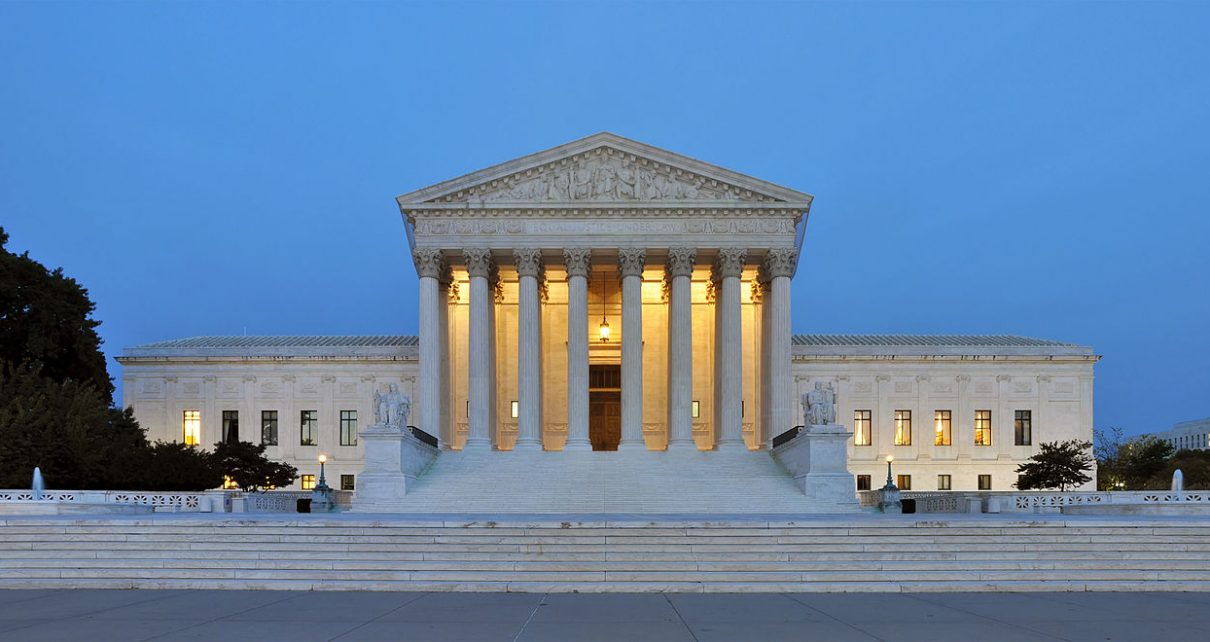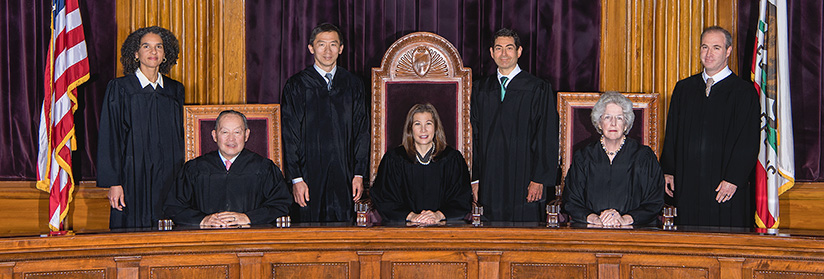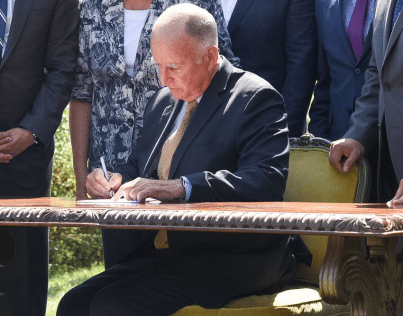
Supreme Court of the United States. (Photo: U.S. Supreme Court)
U.S. Supreme Court Declines to Hear California Offshore Fracking Ban Case
‘People don’t want nuclear, so we need fossil fuels in the meantime’
By Evan Symon, June 5, 2023 9:09 pm
A nearly decade-long battle over offshore fracking in federal waters off the shore of California ended on Monday when the U.S. Supreme Court declined to hear a challenge against a 9th U.S. Circuit Court of Appeals ruling that reaffirmed the ban last year.
The offshore fracking battle began in 2014, when the Environmental Defense Center (EDC) sued to stop offshore fracking in federal waters. Oil companies immediately led a defense, resulting in a four year legal battle in preparation for a U.S. District court hearing in 2018. That year, U.S. District Judge Philip S. Gutierrez ruled that fracking was to stop due to the federal government violating several environmental laws, including the Endangered Species Act and the Coastal Zone Management Act, when it leased the areas to oil companies.
Oil companies quickly appealed the case, but the appeal took a further four years to reach the appellate court, with a logjam of court cases caused by the COVID-19 pandemic. In June of last year, a three-judge panel of the 9th U.S. Circuit Court of Appeals finally heard the case and not only reaffirmed the lower courts ruling, but also found that the federal government had violated even more laws when allowing fracking, including the National Environmental Policy Act.
“The agencies also should have prepared a full environmental impact statement in light of the unknown risks posed by the well stimulation treatments and the significant data gaps that the agencies acknowledged,” said the Appeals panel in their ruling last year. “Environmental groups learned through Freedom of Information Act requests that agencies within the U.S. Department of the Interior had authorized permits for offshore well stimulation treatments without first conducting the normally-required environmental review. Federal agencies failed to take the hard look required by the National Environmental Policy Act when issuing their environmental assessment.”
Attorney General Rob Bonta also praised the ruling, saying in a statement that “Today’s decision is a win for our communities, our environment, and the rule of law. Offshore drilling—particularly fracking—pollutes our waterways, damages our environment, and exacerbates climate change. We saw the risks of offshore drilling firsthand with the Huntington Beach oil spill last year, and we see it every day in the form of the climate crisis.”
With only one other higher court left to appeal to, the American Petroleum Institute, Exxon Mobil, and a California refinery once again moved the case up, this time to the U.S. Supreme Court, asking them in January to review it. In the Exxon Mobil Corporation v. Environmental Defense Center application, the oil companies said that the June injunction was “premature” and would hurt energy production all across the Continental Shelf.
“The ruling threatens to stall vital energy projects beyond the California area, especially since there are no pending applications to begin fracking in the region,” said the companies in January. “If allowed to stand, the decision below will undermine the development of oil, natural gas and renewable energy on the entire Outer Continental Shelf.”
The Supreme Court decides to not hear fracking case
However, on Monday, the court rejected it without explanation, ending the long legal battle by having the Appellate ruling from last year stand and giving a definite moratorium against offshore fracking in federal waters. Environmental groups who had been part of the protracted case expressed joy on Monday following the final ruling.
“The Supreme Court was right to reject the oil industry’s latest attempt to allow fracking and acidizing in our waters with zero meaningful environmental review,” noted Environmental Defense Center attorney Maggie Hall on Monday. “The Santa Barbara Channel is one of the most ecologically rich and important regions in the world. As the climate crisis escalates, ending these destructive extraction practices is a matter of survival — not just for the whales, otters and other animals in the Channel, but for all life on earth.”
However, those in the energy industry warned that the final ruling would actually hurt meeting energy and climate goals in the future as a direct result.
“Access to the vast energy resources offshore is essential for meeting the growing demand for affordable, reliable energy while achieving our climate goals,” said American Petroleum Institute Vice President Holly Hopkins, “API will continue to work with policymakers to advance opportunities that allow for the safe and responsible development of the Outer Continental Shelf.”
Fracking policy consultant Ben Reitman added, “This is all incredibly short-sighted. These environmental groups cannot see the forest through the trees. They just hear fracking and then tell people in Pennsylvania that fire will come out of their faucets. Fracking is a way to get fossil fuels and help create energy as a way to wean off of fossil fuels and transition to renewable energy. It takes along time to transition over, and fracking helps fill that gap. I mean, people don’t want nuclear there, so we need fossil fuels in the meantime. Only problem is that we have tapped many places already, so fracking helps get harder to get oil and gas and gives more time to transition over. Todays decision just really hurt us on that front, especially in California. And that’s not even getting into what jobs and economic benefits it would have brought. This was not a win for anybody.”
Other fracking lawsuits at the federal level are currently pending.
- Bill to Require Law Enforcement Disclosure if AI Was Used To Help Write Reports - August 7, 2025
- Gov. Newsom Files FOIA Request To ‘Expose True Cost’ Of L.A. Federal Troop Deployment for Anti-ICE Riots - August 6, 2025
- California Redistricting: How Newsom’s Plan Will Demolish Hard Fought GOP Gains - August 6, 2025




California Democrat Attorney General Rob Bonta falsely claims that offshore drilling and fracking pollutes our waterways, damages our environment, and exacerbates climate change. Bonta has polluted California with his toxic deep-state Democrat politics and his complete lack of ethics–particularly when it comes to funneling contracts and funds to his wife’s political campaigns and her non-profit activities.
ZEROTIME: Professor Ian Plimer – Climate Change DEBUNKED!
https://zeeemedia.com/interview/zerotime-professor-ian-plimer-climate-change-debunked/
WORLD FIRST: CHEMTRAILS – The Smoking Gun!!! Geoengineering Contracts EXPOSED!
https://zeeemedia.com/interview/world-first-chemtrails-the-smoking-gun-geoengineering-contracts-exposed/
The next time there is a serious shortage of gasoline in California and the price skyrockets due to crude oil shortages, I hope Rob Bonta takes full credit due to his position on fracking. Of course, he’ll just blame the high prices on refiner price gauging.